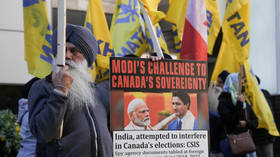Canadian Prime Minister Justin Trudeau is facing opposition from his own party, state broadcaster CBC News reported on Thursday. Over 20 MPs from the Trudeau-led Liberal Party have penned a letter asking him to step down or face “consequences.”
The lawmakers have given Trudeau a deadline of October 28 to make his decision. “What’s best for our party is a change of leadership,” Wayne Long, a Liberal MP, told CBC .
However, Trudeau insisted on Thursday that the “party is strong and united.” The Canadian leader has repeatedly said he plans to lead the party into the next election in 2025.
After nine years at the helm, Trudeau’s popularity has declined, according to the CBC Poll Tracker, which shows the Conservatives having a 19-point lead over the ruling Liberals. Despite 24 votes accounting for just a sixth of a caucus of 152 MPs, and the letter signers being “unwilling to reveal themselves,” CBC noted, the letter serves as a “blow to a prime minister who was already trailing in the polls and facing the daunting challenge of winning a fourth mandate.”
Trudeau’s last four years as head of the government have been marred by the Covid-19 pandemic and economic woes. Inflation and higher interest rates have eroded Canadians’ purchasing power since 2022, particularly for lower-income households, according to a parliamentary report released earlier this month.
According to a report in Politico, the anti-Trudeau MPs believe his “personality” has become a “distraction.” Notably, Conservative Party leader Pierre Poilievre, seen as Trudeau’s biggest rival, has dominated Canadian opinion polls for over a year.
The development also comes amid an ongoing diplomatic row with India over the alleged targeting of Sikh separatists on Canadian soil. Sikhs, which number around 700,000 according to the latest Canadian census, make up a significant voting bloc.
Last year, Trudeau linked the killings to “agents of the Indian government” and launched an investigation to solve the case. In October, Canadian police claimed that Indian diplomats were involved in “widespread violence,” including homicide, and posed a “serious threat to public safety,” while Trudeau stated that New Delhi was making a “fundamental error” by allegedly supporting violence on Canadian soil. New Delhi has repeatedly denied these allegations, claiming Trudeau provided no proof for the claims.
Last week, Trudeau admitted to a Canadian court that his allegations were based on “primarily intelligence, not hard evidentiary proof.” India has suggested that Trudeau’s allegations are “politically motivated.” Following Canada’s fresh allegations, both New Delhi and Ottawa expelled six diplomats, including high commissioners, in a tit-for-tat move.

 By Russia Today | Created at 2024-10-29 18:20:55 | Updated at 2024-11-01 03:38:19
1 week ago
By Russia Today | Created at 2024-10-29 18:20:55 | Updated at 2024-11-01 03:38:19
1 week ago




